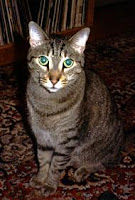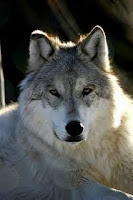As is the case for all egos, Walhydra is convinced that she is the real me, the important me, in this case inconveniently reincarnated as a "sixty-something, gay, would-be writer," who never manages to be as brilliant, as successful—or as invulnerable to pain, loss or mortality—as any ego wishes its human vehicle to be.
Walhydra came into being as a storytelling device in the mid-1990s, when I was invited to join the Crone Thread, a private listserv of mostly pagan, mostly women elders, folk who understand, revere and emulate the crone aspect of the Goddess.
The Crone is that feminine aspect of the Divine which, in the form of a human being past childbearing age, strives on behalf of the race to learn about and teach the terrors and blessings of mortality.
She does this by facing them honestly, walking through them with eyes open, breathing deeply, and returning to tell the tale.
Mary at the cross and Easter tomb of her son was my example when I joined the Crone Thread.
Occasionally, the blog posts tell about a second storytelling alter-ego: Crippled Wolf.
I first "found out" about Crippled Wolf in 2008, in a dream which I retold from his point of view here.
Walhydra learned more about her "psychic twin" in 2009, in a post called The guest. This was around the time that she was becoming too weary and bereft from escorting her mother, Senior Witch, through Alzheimer's to care much about blog posts. Crippled Wolf has been the lead voice since then.
As I wrote in Ruthless,
As for Crippled Wolf, it's not that he feels the sorrow and loss any less. It's just that, being closer to the animal reality of humankind, he can be more dispassionate, more ruthless if necessary, in dealing with what happens to him.I can see in Walhydra' Porch the influence of two writers who helped me to survive my first adult decade in the 1970s.
He feels grief, feels it deeply, yet it is something which happens in the stream of moment, not something which stalls the flow.
He howls his sorrow, yet he knows he must keep acting, keep running, keep hunting, keep playing—not to avoid or deny the pain, but simply to continue being.
One is Kurt Vonnegut, who took profound love of humankind, mixed with unblinking awareness of our capacity to be wicked and foolish, and created an alchemical blend of teaching humor.
 The other is Carlos Castaneda, who led us would-be powerful and enlightened Flower Children a merry chase by writing book after book about a mythical student anthropologist, Carlos Castaneda, and his naive, ego-bound efforts to emulate his wiser self, the Yaqui Indian sorcerer, Don Juan.
The other is Carlos Castaneda, who led us would-be powerful and enlightened Flower Children a merry chase by writing book after book about a mythical student anthropologist, Carlos Castaneda, and his naive, ego-bound efforts to emulate his wiser self, the Yaqui Indian sorcerer, Don Juan.There is actually a third influence: Trickster, in all his variations—particularly as Crow, but also as represented by the Tarot card called The Tower.
In 2008, I wrote a Walhydra story about the origin of my craft name, Bright Crow. Walhydra, resentful as always when she discovers there is something she thinks she already ought to know, quizzes Bright Crow about the lore of Crow.
"But, where are the crows in all of this?"And so it is.
"Crow is shimmering, iridescent black in this world, because his feathers absorb all light. But on the other side, he gleams as bright as light."
"Oh. Bright Crow."
"Yes," says Bright Crow. "Death isn't an evil. It just happens. If anything is evil, it's the hurt we all do to ourselves and to each other in order to pretend that we are escaping death."
"Oh."
"That's why, whenever I hear a crow caw, I turn toward it, touch brow, lips and heart, and say, Blessèd Be'."
"...?"
"Because it is saying to me, 'Don't worry. You're just mortal. You don't have to figure out how to survive all of this.'
"It's saying, 'Just do the best you can for everyone at the moment. Then forgive and ask for forgiveness."
"Oh."
Blesséd Be
Michael Austin Shell

